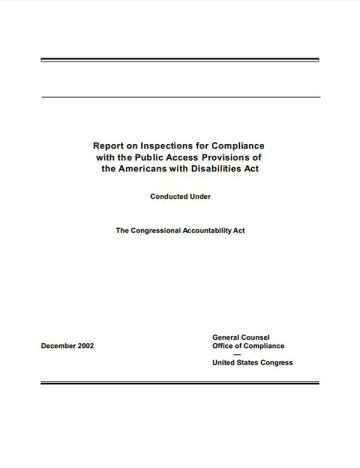EXECUTIVE SUMMARY
The Congressional Accountability Act of 1995 (“CAA”) requires the General Counsel to inspect covered facilities in the Legislative Branch at least once each Congress for compliance with the public services and accommodations provisions in Titles II and III of the Americans with Disabilities Act (“ADA”), and to report the results to the Speaker of the House, President Pro Tempore of the Senate, Office of the Architect of the Capitol, and any other entity responsible for correcting violations. See Section 210(f); 2 U.S.C. Section 1331(f). This Report to the 107th Congress is the third such Report of the General Counsel.
The public services and accommodations provisions of the ADA, as applied by the Congressional Accountability Act, prohibit discrimination on the basis of disability, and require that people with disabilities be given the opportunity to participate in the programs and services offered to the public by covered Legislative Branch entities. All public services and accommodations must be made accessible, at alternative sites or through alternative means when necessary, except when to do so would result in a fundamental alteration in the nature of the program, or in undue financial or administrative burden. The goal of the ADA is to provide accessibility and the opportunity to participate to people with disabilities in an integrated setting whenever possible.
In the unique setting of Capitol Hill, the public services and accommodations provisions of the ADA require that people with disabilities be assured of the opportunity to tour the Capitol, meet with and conduct business with members of Congress, attend committee hearings, and participate in public programs sponsored by Congressional offices. Achieving accessibility may require removal of structural barriers to access (e.g., erecting a ramp at an entrance to a Congressional building) as well as removal of communication barriers (e.g., providing signed interpretive services for a committee hearing).
